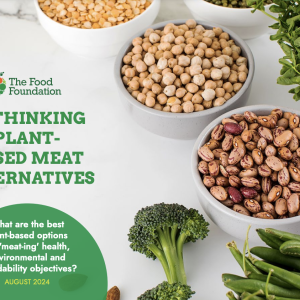
This report by the Food Foundation argues that the health implications of shifting diets towards plant-based diets is nuanced in high income countries, depending on the substitution.It puts forward a categorisation of plant based foods looking at nutrition, environmental and price indicators to assess how categories and individual products compare to meat.
Publisher’s summary
While the environmental case for eating less meat in higher income countries is clear, the health implications of shifting diets towards more plant rich diets is more nuanced, depending on what is being substituted and by whom.
Plant-based alternatives to meat offer a route for reducing meat consumption with the market for plant-based meat alternatives having grown exponentially in recent years. However, focussing on those alternatives that offer the best outcomes for both health and environmental outcomes in order to minimise any potential trade-offs ought to be central to the transition to more healthy and sustainable diets.
In this briefing we devise a taxonomy for a range of plant-based alternatives to meat, looking at both nutrition and environmental indicators as well as price to assess how different categories and individual products compare to meat. Based on the OECD’s taxonomy we split plant-based meat alternatives into three different subcategories: processed (new generation), processed (traditional), and less processed (beans and grains). In total we analysed 104 products sold in UK supermarkets.
This taxonomy finds that the vast majority of plant-based meat alternatives come with significantly reduced greenhouse gas emissions (GHGEs) and water footprints compared to meat, but the nutritional profile of plant-based alternatives varies depending on the product and level of processing.
Much greater nuance is needed when discussing the healthiness of plant-based meat alternatives. Grouping all plant-based alternatives into a single category is an unhelpful strategy for encouraging a shift away from meat and towards more plant-rich diets as it hides a wide variety of options with differing nutrition and health profiles within the plant-based alternative category.
The proportion of ultra processed foods (UPFs) within each plant-based meat alternative category analysed varies considerably, despite media and popular discourse often depicting all plant-based meat alternatives as being UPFs.
Although research on health outcomes associated with plant-based meat alternatives remains limited, this analysis does not find evidence that the nutritional profile of plant-based meat alternatives is on average notably worse than for meat products.
More processed plant-based meat alternatives can therefore be a useful stepping stone for encouraging citizens to shift their diets, although less processed alternatives (beans and grains) offer the greatest number of co-benefits
Reference
Gurung, I. Tobi, R. Leigh-Taylor,K. Buszard, S. Mackean, C. English, A. (2024)Rethinking plant-based alternatives. The Food Foundation
Read more here. See also the TABLE explainer, a cultural history of protein.







Post a new comment »